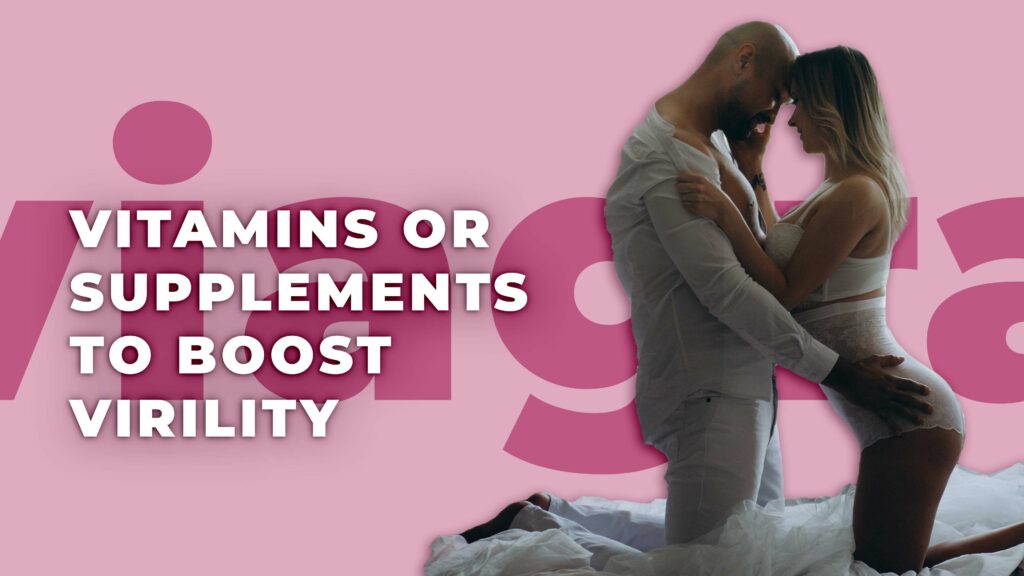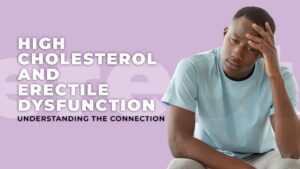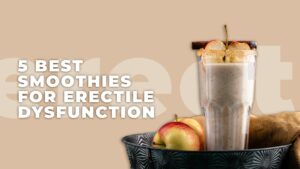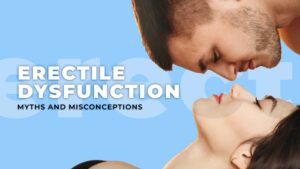Vitamins for sex drive have been a popular topic of conversation lately. Many people are asking whether certain vitamins can increase or lower sex drive. Evidence suggests that certain vitamins can affect our sex drive and sexual performance.
So, if you’ve been considering taking vitamins to increase your sex drive, this blog post is for you. Here, we’ll discuss the link between vitamins and sex drive. We will also explore vitamins that are best for sex drive and how they can impact our sex lives.
Understanding the Connection Between Vitamins and Sex Drive
When it comes to our sex drive, many factors can come into play. These factors include hormones, stress levels, and overall health. But what about vitamins? Can they actually have an impact on our libido? The answer may surprise you.
Research has shown that certain vitamins affect our sex drive and sexual performance. For males, vitamins such as vitamin E, selenium, and zinc are beneficial. They play a key role in maintaining erectile strength and overall sexual health. These vitamins help support the production of testosterone. Testosterone is a key hormone in sexual function.
For females, vitamins can help boost libido and support sexual health. Vitamin E is famous for its antioxidant properties. It can help improve blood flow to the genital area and enhance sexual arousal. Another important vitamin for female sexual health is B- complex. B-complex vitamins help regulate hormone levels and promote overall sexual wellness.
But can vitamins actually lower your sex drive? It’s possible. Certain vitamins, like vitamin B6, can interfere with the production of dopamine. Dopamine is a neurotransmitter that plays a key role in sexual desire. Additionally, we should consume vitamins and supplements in moderation. Excessive intake of vitamins can have negative effects on sexual function.
Vitamins or Supplements to Boost Virility

Virility is a term that is often used to describe a man’s sexual potency or fertility. It can refer to his ability to achieve and maintain an erection. Virility can also state a man’s ability to produce healthy sperm and reproduce.
There is no one-size-fits-all definition of masculinity. It can vary from person to person. Many believe certain factors, such as age, diet, and physical fitness, can affect masculinity. Yet, we have limited evidence for these claims.
Some believe specific vitamins or supplements may positively affect virility or sexual function. These vitamins or supplements include:
1. Vitamin C
Vitamin C helps in producing sex and fertility hormones like androgen, estrogen, and progesterone. Moreover, it stimulates sexual desire. Vitamin C strengthens your immune system and keeps your joints lubricated and pain-free. Vitamin C is high in citrus fruits, strawberries, kiwi, cantaloupe, sweet peppers, and chili peppers.
2. Vitamin D
Vitamin D is also known as the sunshine vitamin. It is necessary for strong bones, muscles, and immune system functioning. It also has a significant impact on how men perform sexually. A study found a link between low levels of vitamin D and decreased male sexual function.[1] The extent of the dysfunction was related to the degree of vitamin insufficiency. This might happen because vitamin D can generate endothelial cells when the body is under oxidative stress. It also helps produce nitric oxide.
3. Vitamin E
Vitamin E is an antioxidant found in various foods. It is rich in nuts, seeds, and vegetable oils. It is also available as a dietary supplement. People believe that vitamin E may have many health benefits, including sexual benefits. We have limited scientific evidence to support these claims.
Some studies suggest that vitamin E may help improve sexual function in men.[2] But the outcomes have shown a mixture of results. A study stated that men dealing with ED saw an improvement in their symptoms when they took a vitamin E.
But, other studies have not found a benefit.[3]
In women, even less evidence suggests that vitamin E affects sexual function. People also believe that vitamin E may help to reduce dryness. They further believe that Vitamin E improve comfort during sexual activity. But there is no scientific evidence to support this claim.
4. Red Ginseng
Due to its effectiveness in treating ED, red ginseng is also called as the “herbal Viagra.” It is sometimes referred to as Panax ginseng.
Ginsenosides are found in red ginseng. They may aid in the relaxation of smooth muscle in the penis to promote an erection. Additionally, it is believed to promote cardiovascular health, which is linked to ED.
A study indicated that red ginseng raised the International Index of Erectile Dysfunction (IIEF) levels. Additionally, improved were sexual satisfaction and erectile function.[4]
Also read: Erectile Dysfunction Myths and Misconceptions Debunked!
Minor reductions in ED symptoms were shown in another trial. But the authors hypothesized that the results might not be significant.[5]
5. L-arginine
L-arginine is a naturally occurring amino acid. It increases nitric oxide synthesis, which can help stimulate erections.
A study found that adding 1,500–5,000 mg of L-arginine to a supplement increased IIEF scores. According to the authors, L-arginine may treat mild to moderate ED.[6]
Another research stated that L-arginine (2,500 mg daily) was effective as the common ED drug Tadalafil (5 mg). It helps in treating mild and moderate ED.[7] The best outcomes came from combining the two treatments.
6. Magnesium
Over 300 bodily processes and operations involve magnesium. It should thus be no surprise that it improves your sexual function and health. Taking magnesium supplements causes both free and total testosterone levels to rise. Both inactive and active males experienced these effects. The active males showed stronger outcomes.
Also, decreasing nitric oxide causes vasoconstriction, further worsened by low magnesium levels. This activity may result in premature ejaculation. Magnesium could play a role in the movement of semen. Magnesium may support your testosterone balance, enhance ejaculatory control, and sustain your erection. Magnesium may indirectly boost libido by raising testosterone levels.
7. Selenium
Selenium is a trace mineral that is essential for good health. Various foods, including nuts, seafood, and grains, contain Selenium. It is also available as a dietary supplement. Selenium insufficiency has been associated with atypical morphology, poor sperm counts, and impaired motility. Men must take selenium and maintain ideal levels to have a greater libido. However, there is limited scientific evidence to support these claims.
Some studies suggest that selenium may positively affect sexual function in men. But the results have been mixed. One study found that men with low selenium levels were likelier to experience ED. Other studies have not found a relationship between selenium and sexual function.
8. Iron
Another essential mineral for boosting your sexual drive is iron. Your cells must get oxygen to function. Fatigue from a lack of iron will affect your libido, making you feel weak. As a result, there is less lubrication, sexual desire, and orgasmic potential. Beans, leafy greens, tofu, and lentils are some examples of foods high in iron.
9. Zinc
Zinc has potential antioxidant properties that may benefit sexual health. Zinc is also essential for the immune system. It can help to balance hormones.
According to research, maintaining appropriate zinc levels is critical for male sexual health.[8] Yet, toxic quantities of zinc can have the opposite impact. Adults should consume no more than 40 mg of zinc per day.
Vitamins for Sex Drive Enhancement in Women
When it comes to boosting female libido, vitamins can play a key role. Like their male counterparts, females can benefit from certain vitamins. There are certain Vitamins that support sexual health and increase sex drive. There may not be as much research on vitamins for female libido. But some key vitamins have been found to be beneficial.
One such vitamin is vitamin E.
This powerful antioxidant improves blood flow to the genital area. It also enhances sexual arousal. By increasing blood flow, vitamin E can help increase sensitivity and pleasure during sexual activity. Foods rich in vitamin E include almonds, sunflower seeds, and spinach.
B-complex vitamins are also important for female libido. These vitamins help regulate hormone levels and promote sexual wellness. B vitamins can help balance mood, reduce stress, and increase energy levels. This can positively impact libido. Good sources of B-complex vitamins include whole grains, beans, and leafy greens.
Besides vitamins, minerals such as zinc and selenium can positively impact female libido. Zinc helps with hormone production and can increase desire and arousal. Selenium is another important nutrient. It helps in production of antioxidants that can protect sexual organs from oxidative damage.
While taking vitamins alone may not solve all libido-related issues. Incorporating these into your diet can provide support for a healthy sex drive. Every woman is different. Consult a doctor before making significant changes to your diet or supplement routine.
Can Vitamins Actually Decrease Your Sex Drive?
Some vitamins and supplements can lower your sex drive. As vitamins can increase libido, they can also have the opposite effect. Vitamins can act oppositely when taken in excess or in certain combinations.
One such vitamin that may lower sex drive is vitamin B6. This vitamin plays a key role in the production of dopamine. Dopamine is a neurotransmitter responsible for feelings of pleasure and sexual desire. But, too much vitamin B6 can actually interfere with dopamine production, decreasing libido.
Besides vitamin B6, certain minerals and supplements can also have an impact on your sex drive. Excessive intake of zinc can actually lead to a decrease in libido. Selenium can also have negative effects on sexual desire if taken in excess.
Vitamins and supplements should be taken in moderation and in consultation with a doctor. What works for one person may not work for another. Excessive intake of vitamins can have unintended consequences. If you experience a decrease in sex drive or any other sexual health concerns, seek advice from a doctor.
The Role of Vitamins in Supporting a Healthy Sex Life
There is a clear link between vitamins and sex drive. Research has shown that certain vitamins can impact our libido and sexual performance. For males, vitamins such as vitamin E, selenium, and zinc are necessary for maintaining erectile strength and sexual health. These vitamins support the production of testosterone, a key hormone in sexual function. Females can benefit from vitamins like vitamin E and B-complex, boosting libido and supporting sexual health.
Vitamins and supplements should be taken in moderation. Excessive intake can actually have negative effects on sexual function. Vitamins alone are not a magic solution for a healthy sex drive.
Vitamins for Erectile Strength

Erectile strength is the ability to achieve and maintain an erection. It can be affected by various physical, emotional, and psychological factors. Maintaining good health through a balanced diet and regular exercise improve erectile strength.
Limited scientific evidence suggests that specific vitamins or supplements can improve erectile strength. Some studies advise supplementing vitamin D[9], red ginseng, L-alanine, L-carnitine, and Tribulus Terrestris[10] to cure mild to moderate ED. They could boost the effectiveness of ED drugs like Viagra and make you last longer in bed. Yet, we have the evidence for these claims. More research is needed to determine their effectiveness.
If you are concerned about erectile strength, you should speak with a doctor. They can help to identify any underlying causes and recommend appropriate treatment options. Treatment may include medications, lifestyle changes, or therapies.
Additional Tips for Maximizing the Benefits of Vitamins for Sex Drive
If you’re looking to maximize the benefits of vitamins on your sex life, here are some extra tips to keep in mind.
First, vitamins alone may not be a magic solution for a healthy sex drive. They can play a supportive role. But you should take a balanced diet, exercise, manage stress levels, and focus on well-being. Taking care of your body as a whole will positively impact your sexual health.
Besides taking vitamins, incorporating other healthy lifestyle habits can further enhance the benefits. Regular physical activity can boost your energy levels. It can also increase blood flow, improving sexual function and desire. Stress management techniques, such as meditation or deep breathing exercises, can help reduce anxiety. These techniques may promote a more relaxed and pleasurable sexual experience.
Another important aspect to consider is communication with your partner. Discussing your desires, needs, and concerns can help foster intimacy and connection. This in turn can positively influence your sex drive. Additionally, exploring new activities or trying different techniques in the bedroom can help keep things exciting and maintain a healthy level of sexual interest.
Lastly, it’s always a good idea to consult with a doctor before making any changes to your diet. They can provide personalized advice and guidance based on your needs and circumstances.
The Final Word

Don’t overlook vitamins’ role in your sex drive and sexual performance. Start consuming these nutrients and enjoy the benefits they bring to your sex life.
There are no specific vitamins that have been proven to increase sex drive. Maintaining good health through a balanced diet and exercise may help improve your libido.
Moreover, many factors can affect sex drive, including physical, emotional, and psychological factors. If you are concerned about your sex drive, you should speak with a healthcare provider. They can help to identify any underlying causes and recommend appropriate treatment options.
Reference
- Crafa A, Cannarella R, Condorelli RA, La Vignera S, Calogero AE. Is There an Association Between Vitamin D Deficiency and Erectile Dysfunction? A Systematic Review and Meta-Analysis. Nutrients. 2020 May 14;12(5):1411. doi: 10.3390/nu12051411. PMID: 32422943; PMCID: PMC7284343. https://www.ncbi.nlm.nih.gov/pmc/articles/PMC7284343/
- Helmy MM, Senbel AM. Evaluation of vitamin E in the treatment of erectile dysfunction in aged rats. Life Sci. 2012 Apr 9;90(13-14):489-94. doi: 10.1016/j.lfs.2011.12.019. Epub 2012 Jan 17. PMID: 22280834.https://pubmed.ncbi.nlm.nih.gov/22280834/
- Herold E, Mottin J, Sabry Z. Effect of vitamin E on human sexual functioning. Arch Sex Behav. 1979 Sep;8(5):397-403. doi: 10.1007/BF01541196. PMID: 496621. https://pubmed.ncbi.nlm.nih.gov/496621/
- Borrelli F, Colalto C, Delfino DV, Iriti M, Izzo AA. Herbal Dietary Supplements for Erectile Dysfunction: A Systematic Review and Meta-Analysis. Drugs. 2018 Apr;78(6):643-673. doi: 10.1007/s40265-018-0897-3. PMID: 29633089. https://pubmed.ncbi.nlm.nih.gov/29633089/
- Lee HW, Lee MS, Kim TH, Alraek T, Zaslawski C, Kim JW, Moon DG. Ginseng for erectile dysfunction. Cochrane Database Syst Rev. 2021 Apr 19;4(4):CD012654. doi: 10.1002/14651858.CD012654.pub2. PMID: 33871063; PMCID: PMC8094213. https://pubmed.ncbi.nlm.nih.gov/33871063/
- Rhim, H.C. et al. (2019) “The potential role of arginine supplements on erectile dysfunction: A systemic review and meta-analysis,” The Journal of Sexual Medicine, 16(2), pp. 223–234. https://doi.org/10.1016/j.jsxm.2018.12.002.
- Gallo, L. et al. (2020) “The daily therapy with L-arginine 2,500 mg and Tadalafil 5 mg in combination and in monotherapy for the treatment of erectile dysfunction: A prospective, randomized multicentre study,” Sexual Medicine, 8(2), pp. 178–185. https://doi.org/10.1016/j.esxm.2020.02.003.
- Fallah A, Mohammad-Hasani A, Colagar AH. Zinc is an Essential Element for Male Fertility: A Review of Zn Roles in Men’s Health, Germination, Sperm Quality, and Fertilization. J Reprod Infertil. 2018 Apr-Jun;19(2):69-81. PMID: 30009140; PMCID: PMC6010824. https://www.ncbi.nlm.nih.gov/pmc/articles/PMC6010824/
- Farag YMK, Guallar E, Zhao D, Kalyani RR, Blaha MJ, Feldman DI, Martin SS, Lutsey PL, Billups KL, Michos ED. Vitamin D deficiency is independently associated with greater prevalence of erectile dysfunction: The National Health and Nutrition Examination Survey (NHANES) 2001-2004. Atherosclerosis. 2016 Sep;252:61-67. doi: 10.1016/j.atherosclerosis.2016.07.921. Epub 2016 Jul 29. PMID: 27505344; PMCID: PMC5035618. https://pubmed.ncbi.nlm.nih.gov/27505344/
- Chhatre, S. et al. (2014) “Phytopharmacological overview of Tribulus Terrestris,” Pharmacognosy Reviews, 8(15), p. 45. Available at: https://doi.org/10.4103/0973-7847.125530.










Leave a reply